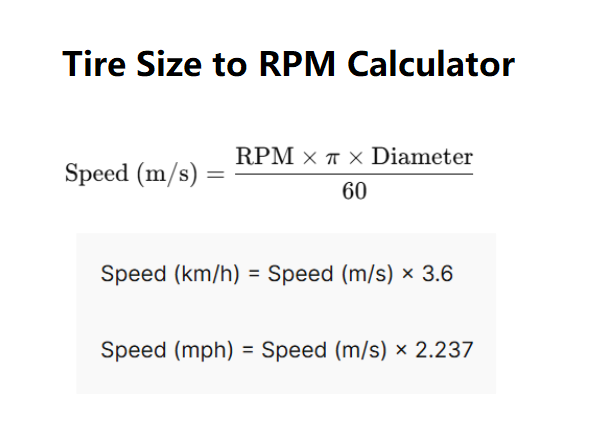 Home
Home
 Back
Back

Tire size and RPM (Revolutions Per Minute) are closely related when determining the rotational speed of a vehicle's wheels based on its linear speed. Below is a detailed explanation of this relationship.
Definition: Tire size, specifically the diameter, refers to the distance across the tire, passing through its center. It is a critical factor in determining how far a vehicle travels with each revolution of the tire.
Uses: Tire diameter is used in automotive applications to calculate speed, RPM, and gear ratios, and to ensure proper vehicle performance.
Definition: RPM represents the number of complete rotations a tire makes in one minute. It is a unit for measuring rotational speed.
Uses: RPM is commonly used to describe the rotational speed of vehicle tires, which directly affects the vehicle's speed and performance.
Definition: Angular speed, measured in radians per second (rad/s), represents the rate of rotation in terms of angular displacement. It is another way to express rotational speed.
Conversion: Angular speed can be calculated from RPM using the formula:
rad/s = RPM × (2π / 60)
The relationship between tire size, vehicle speed, and RPM can be expressed using the following formula:
RPM = (Vehicle Speed in MPH × 63360) ÷ (Tire Circumference in inches × 60)
Where:
To convert RPM to angular speed (rad/s):
rad/s = RPM × (2π / 60)
For example, if a vehicle is traveling at 60 MPH with a tire diameter of 25 inches:
Circumference = π × 25 ≈ 78.54 inches
RPM = (60 × 63360) ÷ (78.54 × 60) ≈ 806.63 RPM
rad/s = 806.63 × (2π / 60) ≈ 84.47 rad/s
Understanding the relationship between tire size, RPM, and angular speed is crucial in automotive engineering, motorsports, and vehicle maintenance. For instance, changing tire size can affect a vehicle's speedometer accuracy, gear ratios, and overall performance. The angular speed (rad/s) is often used in physics and engineering calculations to analyze rotational dynamics.